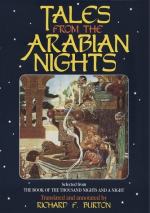[FN#248] i.e. “full moons”: the French have corrupted it to “Badoure”; we to “Badoura.” winch is worse.
[FN#249] As has been said a single drop of urine renders the clothes ceremoniously impure, hence a Stone or a handful of earth must be used after the manner of the torche-cul. Scrupulous Moslems, when squatting to make water, will prod the ground before them with the point o f stick or umbrella, so as to loosen it and prevent the spraying of the urine.
[FN#250] It is not generally known to Christians that Satan has a wife called Awwa ("Hawwa” being the Moslem Eve) and, as Adam had three sons, the Tempter has nine, viz., Zu ’l-baysun who rules in bazars. Wassin who prevails in times of trouble. Awan who counsels kings; Haffan patron of wine-bibbers; Marrah of musicians and dancers; Masbut of news-spreaders (and newspapers ?); Dulhan who frequents places of worship and interferes with devotion. Dasim, lord of mansions and dinner tables, who prevents the Faithful saying “Bismillah” and “Inshallah,” as commanded in the Koran (xviii. 23), and Lakis, lord of Fire worshippers (Herklots, chap. xxix. sect. 4).
[FN#251] Strong perfumes, such as musk (which we Europeans dislike and suspect), are always insisted upon in Eastern poetry, and Mohammed’s predilection for them is well known. Moreover the young and the beautiful are held (justly enough) to exhale a natural fragrance which is compared with that of the blessed in Paradise. Hence in the Mu’allakah of Imr al-Keys:—
Breathes the scent of musk when they rise to rove,
*
As the Zephyr’s
breath with the flavour o’clove.
It is made evident by dogs and other fine-nosed animals that every human being has his, or her, peculiar scent which varies according to age and health. Hence animals often detect the approach of death.
[FN#252] Arab. “Kahla.” This has been explained. Mohammed is said to have been born with “Kohl’d eyes.”
[FN#253] Hawa al-’uzri, before noticed (Night cxiv.).
[FN#254] These lines, with the Nazir (eye or steward), the Hajib (Groom of the Chambers or Chamberlain) and Joseph, are also repeated from Night cxiv. For the Nazir see Al-Hariri (Nos. xiii. and xxii.)
[FN#255] The usual allusion to the Hur (Houris) from “Hangar,” the white and black of the eye shining in contrast. The Persian Magi also placed in their Heaven (Bihisht or Minu) “Huran,” or black-eyed nymphs, under the charge of the angel Zamiyad.
[FN#256] In the first hemistich, “bi-shitt ’it wady” (by the wady-bank): in the second, “wa shatta ’l wady” ("and my slayer”— i.e. wady act. part. of wady, killing—“hath paced away").
[FN#257] The double entendre is from the proper names Budur and Su’ad (Beatrice) also meaning “auspicious (or blessed) full moons.”
[FN#258] Arab. “Hazir” (also Ahl al-hazer, townsmen) and Badi, a Badawi, also called “Ahl al-Wabar,” people of the camel’s hair (tent) and A’arab (Nomadic) as opposed to Arab (Arab settled or not). They still boast with Ibn Abbas, cousin of Mohammed, that they have kerchiefs (not turbands) for crowns, tents for houses, loops for walls, swords for scarves and poems for registers or written laws.




